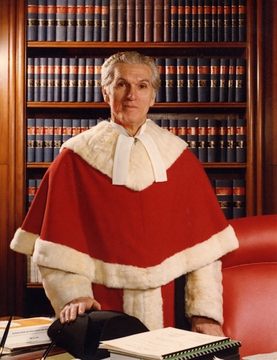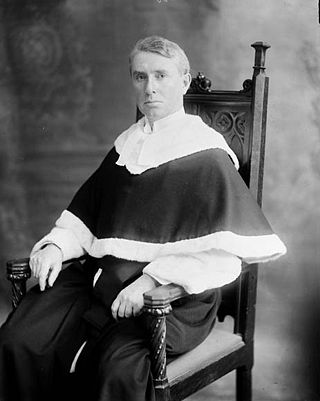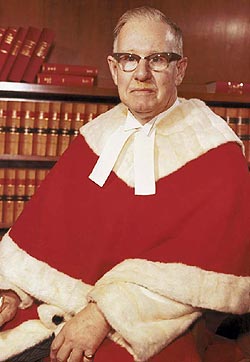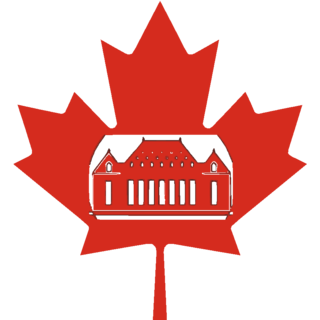Related Research Articles

The Supreme Court of Canada is the highest court in the judicial system of Canada. It comprises nine justices, whose decisions are the ultimate application of Canadian law, and grants permission to between 40 and 75 litigants each year to appeal decisions rendered by provincial, territorial and federal appellate courts. The Supreme Court is bijural, hearing cases from two major legal traditions and bilingual, hearing cases in both official languages of Canada.
The University of Toronto Faculty of Law is the law school of the University of Toronto. Maclean's has consistently assessed the Faculty as the highest ranked common law school in Canada and the highest ranked in terms of faculty journal citations. The Faculty offers the JD, LLM, SJD, MSL, and GPLLM degrees in law.

The chief justice of Canada is the presiding judge of the nine-member Supreme Court of Canada, the highest judicial body in Canada. As such, the chief justice is the highest-ranking judge of the Canadian court system. The Supreme Court Act makes the chief justice, a Crown in Council appointment, meaning the Crown acting on the advice of the prime minister and minister of justice. The chief justice serves until they resign, turn 75 years old, die, or are removed from office for cause. By tradition, a new chief justice is chosen from among the court's incumbent puisne justices.

Osgoode Hall Law School, commonly shortened to Osgoode, is the law school of York University in Toronto, Ontario, Canada. It is home to the Law Commission of Ontario, the Journal of Law and Social Policy, and the Osgoode Hall Law Journal. A variety of LL.M. and Ph.D. degrees in law are available.

Bora Laskin was a Canadian jurist who served as the 14th chief justice of Canada from 1973 to 1984. Laskin was appointed a puisne justice of the Supreme Court in 1970, and served on the Ontario Court of Appeal from 1965 to 1970. Before he was named to the bench, Laskin worked as a lawyer and in academia.

Sir Lyman Poore Duff,, PC(UK) was a Canadian lawyer and judge who served as the eighth Chief Justice of Canada. He was the longest-serving justice of the Supreme Court of Canada.
The Court of Appeal for Ontario is the appellate court for the province of Ontario, Canada. The seat of the court is Osgoode Hall in downtown Toronto.

Wishart Flett Spence was a puisne justice of the Supreme Court of Canada.
The Superior Court of Justice is a superior court in Ontario. The Court sits in 52 locations across the province, including 17 Family Court locations, and consists of over 300 federally appointed judges.

Jean-Marie Philémon Joseph Beetz,, c.r. was a Canadian lawyer, academic and judge from Quebec. He served as a puisne justice of the Supreme Court of Canada from 1974 to 1988.

The Ontario Court of Justice is the provincial court of record for the Canadian province of Ontario. The court sits at more than 200 locations across the province and oversees matters relating to family law, criminal law, and provincial offences.
Torys LLP is a Canadian international corporate law firm with offices in Toronto, Calgary, New York, Montreal and Halifax. The firm acts for a wide range of commercial clients and financial institutions in Canada, the United States, and globally.

Canada (AG) v Lavell, [1974] S.C.R. 1349, was a landmark 5–4 Supreme Court of Canada decision holding that Section 12(1)(b) of the Indian Act did not violate the respondents' right to "equality before the law" under Section 1 (b) of the Canadian Bill of Rights. The two respondents, Lavell and Bédard, had alleged that the impugned section was discriminatory under the Canadian Bill of Rights by virtue of the fact that it deprived Indian women of their status for marrying a non-Indian, but not Indian men.

The Supreme Court of Canada was founded in 1875 and has served as the final court of appeal in Canada since 1949. Its history may be divided into three general eras. From its inception in 1875 until 1949, the Court served as an intermediate appellate court subject to appeal to the Judicial Committee of the Privy Council in Britain. Following 1949, the Court gained importance and legitimacy as the court of last resort in Canada, establishing a greater role for the Canadian judiciary. In 1982, the introduction of the Canadian Charter of Rights and Freedoms significantly changed the role of the Court in Canadian society, by providing the Court with greater powers of oversight over Parliament and through formal recognition of civil rights including aboriginal rights and equality rights.
Justices of the Supreme Court of Canada have the option of releasing reasons for a unanimous decision anonymously by simply attributing the judgment to "The Court". The practice began around 1979 by Chief Justice Bora Laskin, borrowing from the US Supreme Court practice of anonymizing certain unanimous decisions. Unlike in the US, which uses it primarily for uncontroversial cases, in Canada, it is used almost always for important and controversial cases.
Andromache Karakatsanis is a Canadian jurist. She was nominated to the Supreme Court of Canada by Stephen Harper in October 2011. She is the first Greek-Canadian judge on the Court. Since the retirement of Rosalie Abella on July 1, 2021, and of Michael Moldaver on September 1, 2022, she is the longest-serving member of the Supreme Court.
Michael H. Tulloch is a Canadian judge. On December 19, 2022, Prime Minister Justin Trudeau announced the appointment of Tulloch as the new Chief Justice of Ontario. He is the first Black judge appointed to the Ontario Court of Appeal and the first Black Chief Justice of any province.
Re Drummond Wren [1945] O.R. 778 is a decision by the Ontario High Court, presided by Justice Mackay, regarding the validity of a racially motivated restrictive covenant. The Workers' Educational Association purchased the lot in East York. The covenant prohibited the land to be sold to "Jews, or persons of objectionable nationality". Drummond Wren brought forward an action to have the restrictive covenant declared invalid. Wren was the general secretary of the Workers' Educational Association. He was represented by John Cartwright and Irving Himel. J. M. Bennett appeared as legal counsel for the Canadian Jewish Congress, assisted by Bora Laskin, Jacob Finkelman, and Charles Dubin.
The Bora Laskin Faculty of Law is the professional school of law of Lakehead University in Thunder Bay, Ontario, Canada.
John B. Laskin is a justice of the Federal Court of Appeal of Canada.
References
- ↑ "Former Judges of the Court of Appeal for Ontario", Court of Appeal for Ontario website, archived from the original on 2021-09-19, retrieved 2021-09-19
- ↑ "Judicial Biography" . Retrieved September 10, 2013.